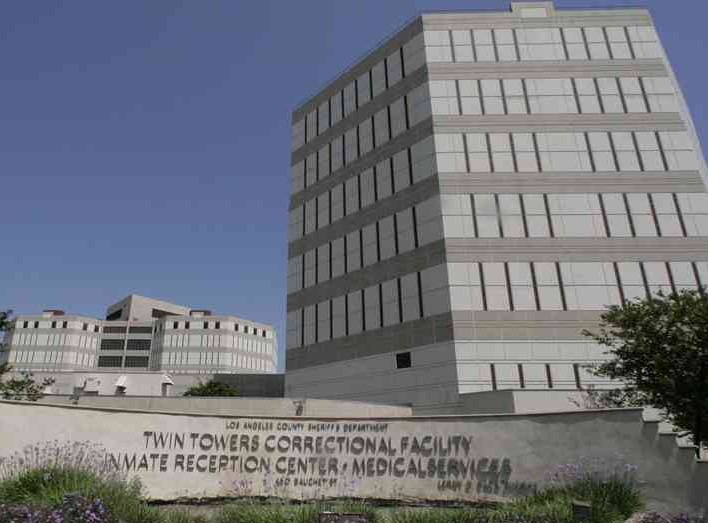
LOS ANGELES – The Justice Department concluded that, despite progress in some areas, Los Angeles County jails violates the constitutional rights of mentally ill inmates and failed to provide adequate suicide-prevention ways to keep prisoners from harming themselves, according to a report released today.
In addition, the Justice Department found that there are other serious deficiencies in the delivery of mental health care along with inadequate supervision and deplorable environmental conditions to deprive prisoners of constitutionally-required mental health care, according to officials.
But officials also noted that the county has made substantial progress in fixing the problems.
The Los Angeles County jail system is the largest in the country, housing approximately 19,000 pre-sentenced and sentenced prisoners in seven facilities throughout the county.
The Los Angeles Sheriff’s Department operates the jails system and supports the delivery of mental health services within the jails by the county’s Department of Mental Health.
The comprehensive report was sent to the county Wednesday and made public today, confirming that certain jail conditions and practices continue to violate the rights of mentally ill prisoners.
Citing the 15 suicides at the jails in less than 30 months, the Justice Department concluded that some of the deaths may have been preventable with proper suicide prevention practices, officials said.
There have been 15 suicides at the jails in less than 30 months, and the Justice Department concluded that some of the deaths may have been preventable with proper suicide prevention practices.
The Justice Department intends to enter into discussions with officials from the Los Angeles County Sheriff’s Department and the county’s Department of Mental Health to address the results of the evaluation.
The challenges that the county faces in providing constitutionally adequate mental health services at the jail are driven in part by a rapid increase in the number of prisoners who are seriously mentally ill, officials said.
Authorities said the county has begun to take steps to expand diversion programs that will provide community supervision and treatment in a manner consistent with public safety.
Here are other findings from the report:
- Widespread lapses with regard to basic supervision of prisoners at risk
- Deficient mental health care for prisoners with clearly demonstrated needs
- Deplorable environmental conditions, most acutely at Men’s Central Jail
- Suicide review process that often includes inaccurate information
- Fails to remedy evident and repeated problems in order to prevent similar incidents in the future.
In 2002, the Justice Department entered into a Memorandum of Agreement with the county to resolve a long-standing civil investigation into conditions of confinement at the jails under the Civil Rights of Institutionalized Persons Act.
Civil Rights of Institutionalized Persons Act. was enacted in 1980 to eradicate egregious and harmful conditions that result in a pattern or practice of civil rights violations in jails, prisons, juvenile justice facilities and other public institutions. CRIPA authorizes the Justice Department to investigate and, if necessary, initiate a civil action to guarantee the federal and constitutional rights of institutionalized persons.
The memorandum gives the Justice Department access to personnel, documents and prisoners to evaluate the county’s compliance with the memorandum, officials said.
The Justice Department is assisted by expert consultants in correctional mental health care and suicide prevention, and provides ongoing technical assistance as part of its monitoring activities. The county has cooperated fully and openly with the Justice Department, officials said.
Substantial Progress at Jails Noted
While significant lapses were found, the Justice Department’s assessment reveals that the county has achieved substantial compliance with certain aspects of the memorandum, authorities said.
For example, the county has implemented nearly all provisions related to mental health screening at intake, developed a robust electronic medical records system, increased the number of clinical and support staff, and ensured that custodial staff receive initial and ongoing training in the identification and custodial care of prisoners with mental illness.
The county has demonstrated a sustained level of acceptable performance and improvement in these areas, which will no longer be subject to evaluation under the memorandum, according to officials.
The Justice Department expects that those memorandum requirements that are in substantial compliance will terminate and no longer be subject to monitoring. The department will propose additional corrective action in the form of a court-enforceable agreement to address the remaining areas with serious deficiencies that violate prisoners’ constitutional rights, officials said.
This week’s compliance letter includes a comprehensive list of recommended remedial measures that are designed to ensure adequate mental health treatment, supervision, suicide prevention and conditions of confinement for prisoners throughout the jails, officials said.

